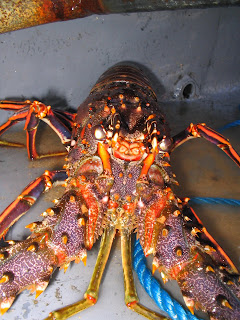The idea of a sustainable management of marine resources may sound far fetched nowadays, however, there are a few examples of sound management that give some hope. I'll mention a couple. Now more than ever, the stewardship of our oceans (and our lands) should be taken seriously. The combination of climate change and a surfeit of man-made threats are ravaging the world's ocean biodiversity and have reached an alarming point. Perhaps a point of no return in some cases.
Sixty percent of the world's coral reefs are being imperiled by overexploitation, pollution, and unplanned coastal development. Large predatorial fish e.g. shark, cod and tuna have been largely overfished in the last half century, if the status quo persists, they could be gone by 2050 according to scientists.
When it comes to unsustainable fisheries, almost all the countries with coastline, developed or developing, share some blame. From the wasteful shrimp trawl industry of the Gulf of Mexico in the U.S., to the detrimental aquarium fish and live reef food fish trade in the Philippines and Indonesia.
We are taking so much fish that not enough remain to replenish the populations, that is the definition of overfishing. Most of the world's fisheries are over exploited, depleted or recovering from depletion according to the Food and Agriculture Organization (FAO). A remarkable example is the tuna fisheries --fueled by the world's sushi craze!-- where the highly efficient fishing fleets are plundering populations from the ocean. Regarding the whales, it is no secret that the Japanese and Norwegian fleets are wreaking havoc under the guise of "scientific research". And... the same story goes for many shellfish species.
But there is some hope. In the Caribbean coast of Central America a first time annual four-month ban on the fishing of the Caribbean spiny lobster (Panulirus argus) went into effect in 2010. The time frame, from March to June, corresponds to the breeding season of the lobsters. Although the enforcement of the ban might not be as good as the one in southern Florida, it is a good step ahead towards sustainability.
In Costa Rica another plausible initiative to sustainably exploit Spotted rose snapper (Lutjanus guttatus) is taking place in the NW Pacific coast of the country. It will benefit small artisan fishermen that use bottom longlines to fish the snappers. The effort also seeks to develop their marketing capabilities to boost their revenue.
In northeastern U.S. the Northwest Atlantic Marine Alliance (NAMA) is promoting a Community Supported Fishery (CSF) in an effort to promote local, sustainably managed, wild-caught seafood in the same fashion of the Community Supported Agriculture (CSA) programs which are popular in many parts of the country.
There is an outstanding website that can help you make good purchasing decisions wherever you buy your seafood. It is the Monterey Bay Aquarium's Seafood Watch Pocket Guide. This is not only extremely helpful for people living in the U.S., but folks outside North America will also find useful information on species that are harvested throughout the world.




No comments:
Post a Comment